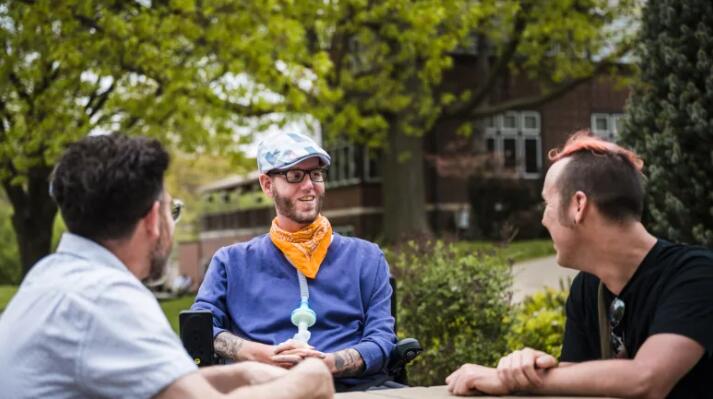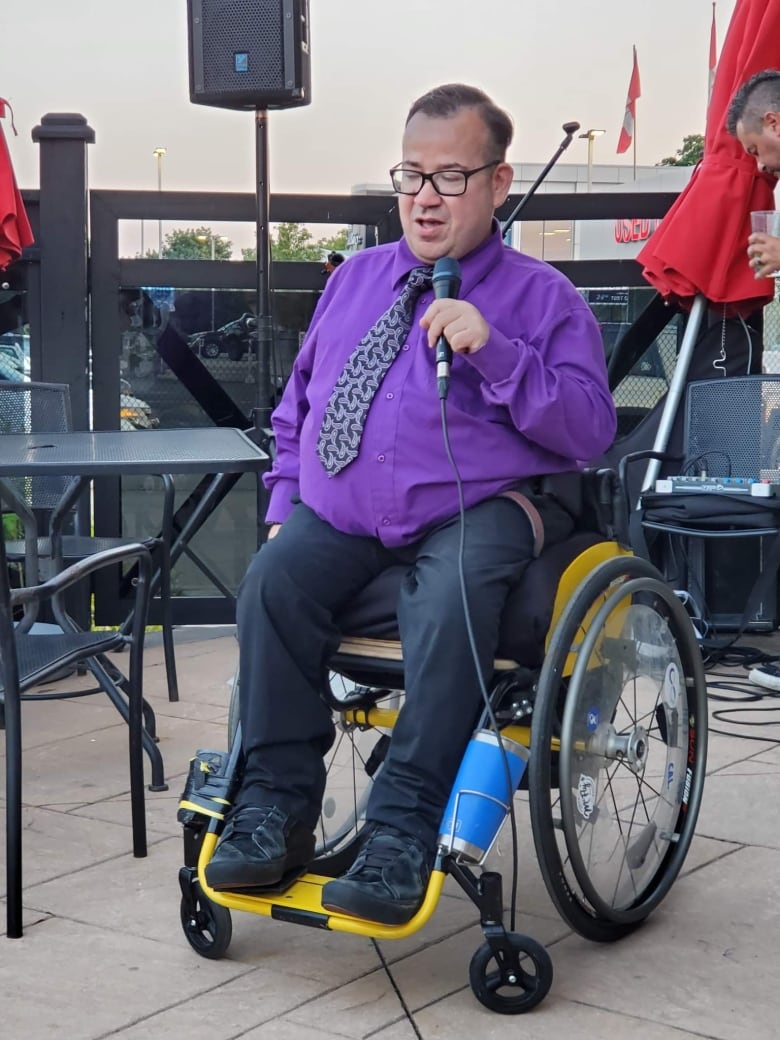How Hamilton candidates with disabilities get the message out when they can’t go door-to-door

Candidates in Ward 1 and Ward 8 focus on online connections and in-person events over door-knocking
It can be hard to knock on doors if you use a wheelchair to get around – so two Hamilton candidates in the upcoming municipal election are running their campaigns a little differently.
Anthony Frisina (Ward 8) and Ian MacPherson (Ward 1), who both use wheelchairs, plan to run their campaigns largely without door-to-door canvassing, relying on in-person events and online engagement in their attempts to secure seats on city council.
Frisina, who is running a campaign largely centred on improving accessibility, says he isn’t focused on the aspects of the race that pose a challenge, such as door-to-door canvassing. He’s hopeful he can reach Ward 8 voters through social media, virtual meetings and public meet-and-greets such as his campaign launch Thursday night at Turtle Jack’s on Upper James Street.
“I’ve done a lot of work through social media, and been able to cultivate relationships with people in the ward,” said Frisina, who lives on Limeridge Road West, and works at Mohawk College, which is also in Ward 8.

He has been a longtime advocate for inclusion and accessibility, including hosting a show on the matter on Cable 14, and is part of city council’s advisory committee for persons with disabilities. He was awarded the Order of Hamilton in 2020 for his volunteer work and advocacy. He’s hoping his efforts have led to some name recognition that will help earn votes.
“People have also known me and understood my work in the community over the years,” he says.
Disability is a category that everyone will fit in someday.– Sarah Jama, co-founder of the Disability Justice Network of Ontario, referring to the challenges people face as they age
If he wins, he’d like to help push Hamilton forward on accessibility issues, helping the city become a leader creating an accessible city well beyond what he calls the “bare minimum” of the Accessibility for Ontarians with Disabilities Act, which mandates accessibility of services in the province but does not require retrofits for numerous types of businesses and public spaces. Areas of focus for him include safer street crossings, with more audible and visible signals, and better transportation options for people with disabilities.
“Our autonomy and our agency is equally as important as everyone else,” he told CBC Hamilton, noting he’s not unhappy with the job done by current Ward 8 councillor John-Paul Danko, but thinks more could be done on accessibility and inclusion issues.
“[The disability community has] the representation by way of population, but a lot of the infrastructure tends to be a miss [thanks to] the ableism that continues to exist both subconsciously and consciously.”
Disabled folks often face financial hardship, says candidate
MacPherson, who’s running in Ward 1, says he’s spoken with Frisina about the need to build everything in an accessible way from the start, rather than having to waste money later on retrofits and fixes.
His decision to run for office partially stemmed from his discontent with the two-way Main Street proposal successfully pitched by current Ward 1 councillor, Maureen Wilson.
He agrees the street is unsafe – particularly its intersection with Dundurn Street, near his home – but says he thinks the proposed solution is expensive, takes too long to implement, and that the city also needs to do more to address the dangerous intersection at nearby Dundurn and King streets. (That intersection is one of those the city is currently studying in a safety review.)
- Mohawk College faces backlash for shuttering one-of-a-kind Accessible Media Production program
-
ONTARIO VOTES 2022
What’s wrong with ODSP? Advocate says rates must be doubled, support should be election issue
He has created his own proposal, which he says he sent to the city clerk before the Main Street vote, that would see a five-second pause between each phase of traffic.
“This will cost virtually nothing, can be done tomorrow and will stop the majority of accidents in such dangerous intersections because if someone runs the red everything else is stopped for five seconds, [there will be] no pedestrians crossing or cars passing through the intersection to interfere with the vehicle running the red light,” he wrote in a Facebook post announcing his candidacy.

MacPherson, who studied political science at McMaster University before switching to social physiology, says that having a disability often puts him at a disadvantage, or at least makes him wonder if he is at one.
“You look at people and you say, ‘They’re ahead of me because they can talk louder, they don’t have to stop and catch their breath. They can go wherever they want and don’t have a worry,'” he told CBC Hamilton on Thursday, adding that people who have a disability who want to participate in politics are also often on an uneven playing field financially.
“Most people who have a disability are on ODSP. They struggle to get started.”
- Ancaster Coun. Lloyd Ferguson announces he will retire, won’t run for re-election
- Hamilton to introduce new measures to make voting more accessible in municipal election
The campaign is holding a kick-off event July 30 from 1 to 5 p.m at Hamilton Christian Fellowship, at 135 Strathcona Ave. N. MacPherson says friends and volunteers will help him deliver flyers to let residents know the details. He says he hasn’t encountered any physical barriers yet, but it’s still early days.
“Debates seem to be on a stage,” he noted, wondering if they would be held somewhere he can attend.
‘Disability is a category that everyone will fit in someday’
Hamilton resident Sarah Jama, co-founder of the Disability Justice Network of Ontario, uses mobility devices and has worked on several political campaigns – including those for Hamilton Centre MPP Andrea Horwath, Hamilton Centre MP Matthew Green and Ward 3 Coun. Nrinder Nann.
She says that beyond the obvious physical hurdles – campaign offices that aren’t fully accessible, among them – people with disabilities face psychological challenges as well.
“It’s almost impossible for disabled people to campaign in a way that doesn’t harm them,” she said, noting disabled candidates often face “ableist rhetoric [about] who is fit to run for office.”
In a post on civic affairs blog Raise the Hammer in 2018, previous Ward 1 candidate Sophie Geffros, who uses mobility aids, described repeated comments from residents about their physical health and suitability for the role.

“We had voters ask my campaign manager if I would be in good enough health to be a councillor,” Geffros wrote in the post. “We had people angrily ask why I personally hadn’t knocked on their door, when they lived at the top of a flight of stairs and I was in fact sitting at the street at the bottom.”
Jama believes all levels of government will be better served by electing people with disabilities, particularly now, when long-haul COVID-19 is leaving increasing numbers of people disabled.
“Disability is a category that everyone will fit in someday,” she said, referring to the challenges people face as they age.
“We need more people who are disabled who are willing to talk about the disabling conditions we’re facing [and] make policy to better the systems that we’re in.”
Related News
Trade war, slumping border traffic: What does that mean for the Gordie Howe bridge?
Amid U.S. President Donald Trump’s tariffs which have triggered a trade war with Canada, cross-border trips haveRead more
Trump administration threatens Harvard’s foreign enrolment, tax-exempt status
U.S. Homeland Security Secretary Kristi Noem speaks during an event on April 9, in Washington,Read more
